Despite FIFA’s Pressure, Iran Not To Allow Women To Referee Men’s Matches
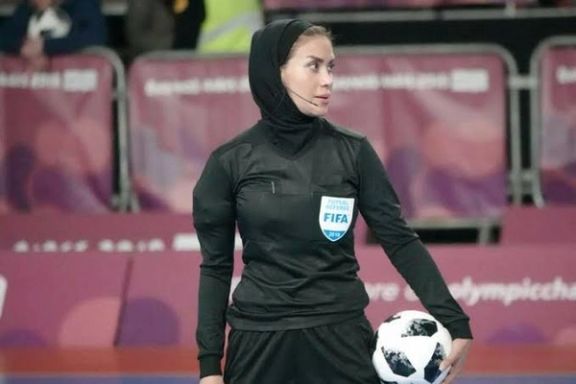
An Iranian official has rejected reports that the international governing body of football, FIFA, is forcing Iran to let female referees officiate matches in the men's league.

An Iranian official has rejected reports that the international governing body of football, FIFA, is forcing Iran to let female referees officiate matches in the men's league.
Khodadad Afsharian, the head of the referees' committee of the country, said on Monday that although it was one of FIFA's demands, there is no requirement to do so and all national matches in men's and women's categories will continue to be judged by their respective referees.
Last week, he told the media that FIFA has asked the country’s federation to employ women referees for men's games, adding that the issue will be taken into consideration for the youth leagues.
He also said that women referees will participate in training courses on the use of Video Assistant Referee (VAR) Technology, which will be added to the country’s matches in the near future.
Late in August, under pressure from FIFA, 500 female fans were allowed into Tehran's Azadi Stadium to watch a local league football match.
Tickets were sold only to 500 female fans and a special forces unit consisting of female anti-riot police was present to lead them to their secluded section of the 100,000-seat stadium.
The world’s soccer authority had tried to convince Iran’s government to lift an unwritten ban on women attending stadiums to watch male players for nearly a decade. The ban has led to many arrests, beatings, detentions, and abuses against women.
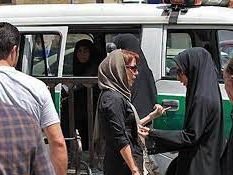
An Iranian government entity enforcing Islamic rules says the intelligence ministry has arrested 300 anti-hijab activist “ringleaders” working “for the enemy.”
Ali Khan-Mohammadi, spokesman of the Enjoining Good and Forbidding Evil Headquarters, said Sunday the activists who worked for “the enemy” and “combated the Islamic Republic’s hijab rules in various ways” were arrested in concurrence with the implementation of the Hijab and Chastity Regulations in government offices, he added.
He did not provide more details, but some social media activists and women who removed their headscarves in public as a sign of protest have been arrested since mid-July.
Hardline media say implementation of the Hijab and Chastity Regulations will soon be more strictly applied in other establishments such as shopping centers. Authorities are also giving more power to law enforcement, security guards in public parks, as well as ordinary citizens to admonish those whose appearance does not conform with the prescribed dress code.
Although the government says “admonishment”, but special morality police scouting the streets actually arrest women for violating the Islamic dress code.
Harsher than usual enforcement of the hijab in the past few months has raised protests from many in Iran including some moderate religious and political figures.
In early July President Ebrahim Raisi ordered the implementation of stricter regulations. He put an ideological spin on the issue and accused foreign enemies of the Islamic Republic and Islam of using extensive satellite TV and social media networks to “target the society’s cultural backbone and foundations of its religious values.”
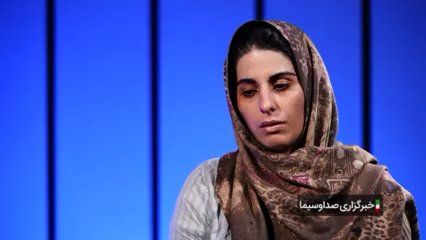
Khan-Mohammadi, a low-ranking cleric, also alleged that “the enemy” conducts intensive cultural activities against the hijab, including through importing goods and clothing that are against the society’s Islamic norms, and thanked security and intelligence forces for neutralising such plots.
There is no evidence of any foreign conspiracy, except some Iranian activists in the West campaigning against compulsory hijab. One such activist in the United States was even reportedly targeted for kidnapping or assassination by Islamic Republic agents.
The staff of the Enjoining Good and Forbidding Evil Headquarters are trained and responsible for admonishing or detaining citizens, particularly women if Islamic regulations, including hijab rules, are ignored or not abided by.
In the past few months women and anti-hijab activists have come under such intense pressure that even many women who wear the hijab by choice have joined a social media campaign against forced hijab and hijab enforcement street patrols.
Sepideh Rashno, a 28-year-old artist and writer, for instance, was arrested because of an acrimonious dispute with a hijab enforcer in a city bus on July 16 and posting a video of her quarrel with the hijab enforcer on social media which went viral.
She was tortured into denouncing herself and other activists, expressing regrets for her confrontation with the hijab enforcer, and posting the video on social media.
Rashno has not been put on trial yet, but her so-called “confessions” were aired by the state-run television (IRIB) soon after her arrest. She had been so badly beaten before the telecast that bruises were quite visible on her face.
Rashno has been charged with “association and collusion with the intention of committing a crime against the country's security through communication with foreigners and propaganda activity against the Islamic Republic and encouraging people to commit corruption and prostitution" and “propaganda against the Islamic Republic”. Authorities have set Rashno’s bail at a very high sum of 8 billion rials.
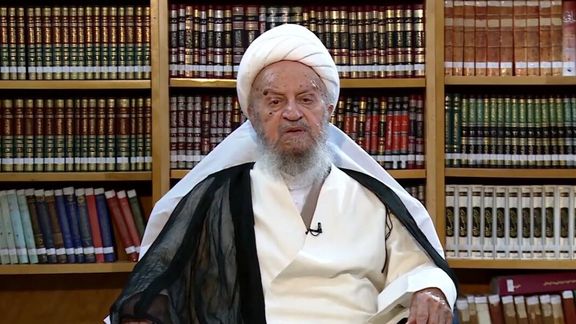
A top cleric in Iran has tried to distance himself from a major bribery case as the man arrested red-handed for receiving a hefty bribe in euros is his relative.
Iranian analyst Ehsan Mehrabi told Iran International TV that the suspect, a chief inspector in the office of Roads and Housing Minister Rostam Ghasemi would have not been able to receive the bribe if he had not used his link to hardliner Ayatollah Naser Makarem Shirazi.
Qasem Makarem Shirazi, a grandson of the Ayatollah's brother was initially named as a candidate for the post of deputy minister of roads and housing, but intelligence organizations in Iran rejected his appointment. Nontheless, the minister appointed him as an adviser and chief inspector, a post that did not need clearance from the intelligence authorities, reports from Tehran said.
A statement issued by the office of Makarem Shirazi made it clear that man was not his son or grandson but stopped short of saying that he was linked to him anyway. The statement added that the bribe-taker had no business link to the ayatollah's office and was never supported by that office in Qom.
Earlier, Vice President Mohammad Hosseini had confirmed that a high-ranking roads and housing ministry official was arrested but did not name anyone. Later the ministry named the man and a lawmaker, Ardeshir Motahari, revealed at the that the detainee was arrested while receiving a bribe in euros.

Motahari wrote in several tweets that the minister should be summoned to the parliament and questioned about the case, but he was pretending to be ill. Ghasemi's pictures appeared in the media on a hospital bed while government spokesman Ali Bahadori was visiting him. The ministry said that Ghasemi had a back pain.
Meanwhile, Khabar Online reported that the minister appeared in public at a meeting with Vice President Mohammad Mokhber Saturday afternoon, only a few days after what he said was a spinal surgery.
Khabar Online wrote that public opinion expects an explanation from the minister. The website also said that the revelation about the bribe, has heightened expectations that Ghasemi, who was already on parliament’s crosshairs, will be fired.
Since President Ebrahim Raisi took office in August 2021 Iran’s economic situation has deteriorated further with a close to 50-percent inflation rate abd a falling currency. As US sanctions continue in the absence of a nuclear deal, Raisi has been unable to fulfil his campaign promises, such as building one million housing units a year.
This led to an early push in parliament to impeach some of his economic ministers, Ghasemi being the first target. So far, higher authorities have prevented that from happening but the bribery scandal can be the last straw to break the camel’s back.
Khabar Online said that President Raisi is likely to take advantage of the case and fire his minister to prove that he has no red lines in his much-heralded campaign against corruption.In a report on Sunday, Rouydad24 website said that Ghasem Makarem Shirazi was a candidate for parliament from Shiraz in 2020 but did not win. He joined the Ministry after Rostam Ghasemi, who also comes from the Fars Province, became the Minister of Roads and Construction.
Since taking office in August 2021, the Raisi administration has been under fire by critics and even supporters for the nepotism that led to appointing unqualified individuals.
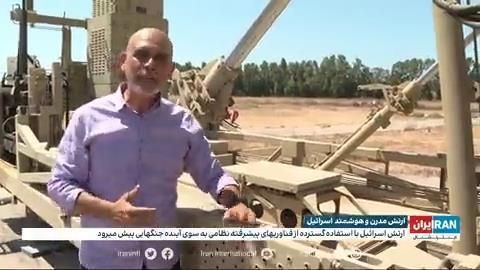
The Israeli military authorized Iran International’s team to film and report at an Iron Dome base, making it the first Persian-language channel inside the defense system.
The online outlet for the Israeli Yedioth Ahronot newspaper, Ynet, published an article on Saturday, reporting that the Israeli Defense Forces had allowed Iran International to visit the site.
Against the background of the mutual threats between Israel and Iran, and attempts to restore the nuclear agreement, the IDF for the first time authorized the cameras of a channel broadcasting in Persian to enter an Iron Dome base, Ynet said, adding that “The channel's reporter even spoke in Hebrew with fighters and commanders at the base.”
Mashregh News, a website in Tehran affiliated with Iran’s Revolutionary Guard reported on this development, harshly attacking Iran International for visiting an Israeli military installation, while the country is threatening Iran with an attack.
The report by the channel’s correspondent Babak Es’haghi (Babak Itzhaki) was broadcast from inside a base near the Gaza border this week.
Iron Dome is a mobile all-weather air defense system designed to intercept and destroy short-range rockets and artillery shells.
The Iron Dome missile defense system successfully intercepted 97 percent of incoming rockets launched by the Iran-backed Palestinian Islamic Jihad group in their latest bout of violence in August.
On Sunday, Israeli Prime Minister Yair Lapid said the country is leading “an intensive campaign” meant to prevent the signing of “a dangerous” nuclear deal between Iran and world powers.

A rights group says the Islamic Republic has sentenced two LGBTQ activists to death on charges of "corruption on earth through the promotion of homosexuality."
Hengaw Organization for Human Rights said on Sunday that the verdict was issued by the Revolutionary Court of the city of Orumiyeh (Urmia), in West Azarbaijan province against Zahra Sedighi-Hamedani (31), known as Sareh, Elham Choubdar (24). Another woman, Soheila Ashrafi (52), was involved in the joint case, but her verdict has not been issued yet.
In July, Iran’s Revolutionary Guard said Sedighi-Hamadani has been slapped with new charges of "trafficking Iranian women" to Erbil, in Iraqi Kurdistan, referring to her as Zahra Mansouri Hamedani. She was first arrested on charges linked to an appearance in a BBC documentary on gay rights in Iraqi Kurdistan.
She was arrested while trying to cross the border and seek asylum in Turkey on October 27, 2021. She was held in solitary confinement for 53 days, during which, the Revolutionary Guard subjected her to intense interrogations, insulted her identity and appearance, threatened to execute her and to take away custody of her children.
On January 16, Sareh was accused of “spreading corruption on earth,” including through "promoting homosexuality”, “communication with anti-Islamic Republic media channels” and “promoting Christianity.”
Rights group Amnesty International appealed to Iran’s Chief Justice Gholamhossein Mohseni-Ejei on January 25, calling for release.

An Iranian lawmaker says the Islamic Republic gives drones to Iraq and other countries to help them provide for their own security and the security of the region.
Mohammad Javad Karimi Ghoddusi (Qoddusi), a member of the Iranian parliament's National Security and Foreign Policy Committee, said on Sunday that Iran “generously” provides drones to every country that needs them “according to the strategy of Islam and in line with maintaining the region’s security.”
He said the country’s drone industry and all its costs are justifiable for Iran’s defense system because it has not prioritized the strategy of expensive and complex aircraft.
Claiming that “the Americans admit their air supremacy in the world has been challenged by Iran,” he said that “the combination of Iran’s missiles and drones' capabilities has created a very extensive, deep, precise and low-cost security for the entire Islamic nation and Islamic countries.” They pay for the drones and Iran’s aid is not free, he added.
Last week, a member of the Ukrainian parliament, Yuliya Leonidivna Klymenko, told Iran International that she was “deeply shocked and saddened" by the fact that Iran sent drones to Russia to be used in its invasion of Ukraine, noting that Moscow is going to buy 100 more drones from Iran in addition to the drones it recently bought from the Islamic Republic.
US Defense Department spokesperson Todd Breasseale said on Tuesday, August 30, that Russia has faced "numerous failures" with Iranian-made drones acquired from Tehran this month, adding that the United States assesses Russia has received the delivery of Mohajer-6 and Shahed-series unmanned aerial vehicles (UAVs) over several days this month.